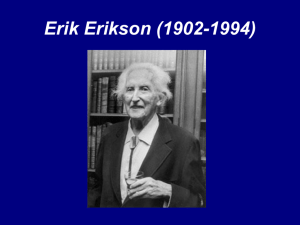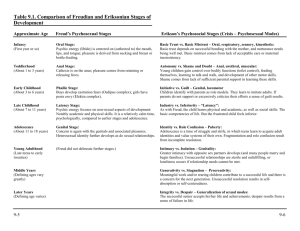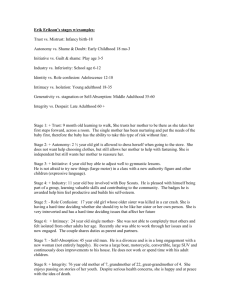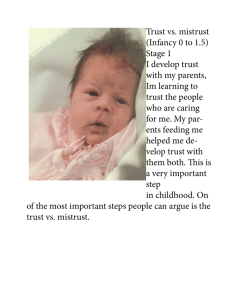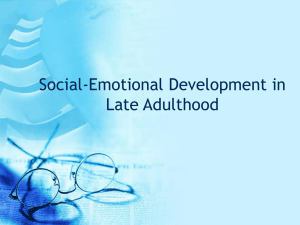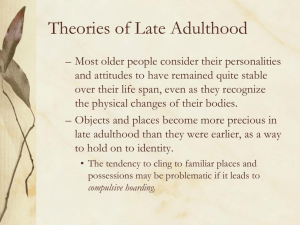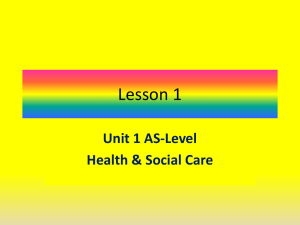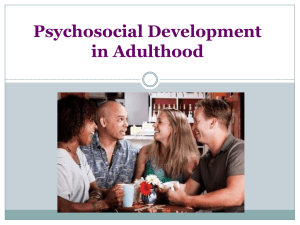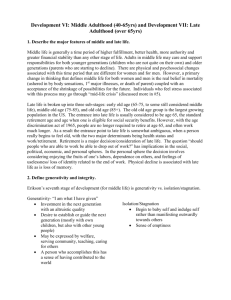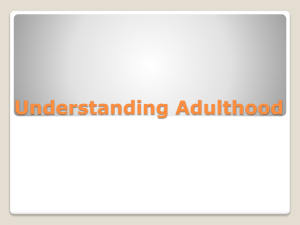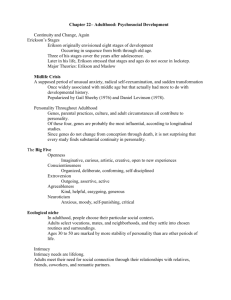Developmental Theories Summary: Erikson, Freud, Piaget
advertisement
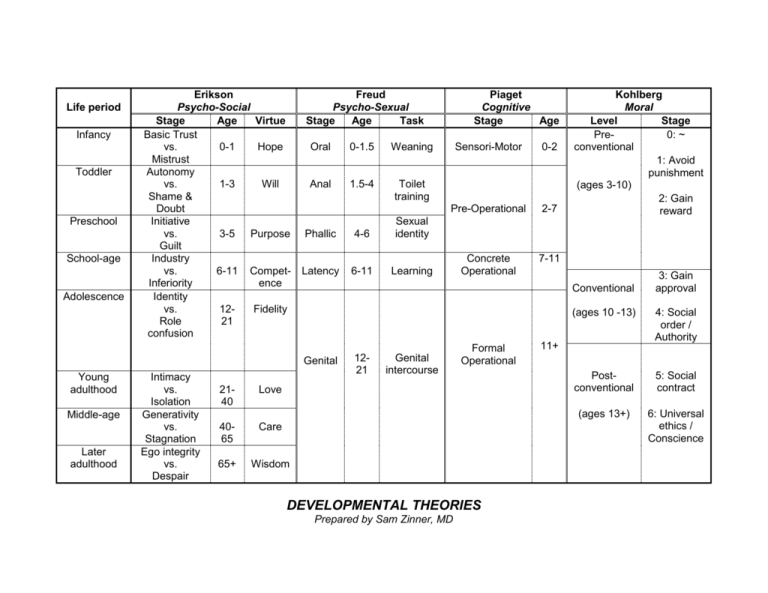
Life period Infancy Toddler Preschool School-age Adolescence Erikson Psycho-Social Stage Age Virtue Basic Trust vs. 0-1 Hope Mistrust Autonomy vs. 1-3 Will Shame & Doubt Initiative vs. 3-5 Purpose Guilt Industry vs. 6-11 CompetInferiority ence Identity vs. 12Fidelity Role 21 confusion Freud Psycho-Sexual Stage Age Task Oral 0-1.5 Weaning Anal 1.5-4 Toilet training Phallic 4-6 Sexual identity Latency 6-11 Learning Middle-age Later adulthood Intimacy vs. Isolation Generativity vs. Stagnation Ego integrity vs. Despair 2140 Sensori-Motor 0-2 Pre-Operational 2-7 Concrete Operational 7-11 1221 Genital intercourse Formal Operational Love 4065 Care 65+ Wisdom Kohlberg Moral Level Stage Pre0: ~ conventional 1: Avoid punishment (ages 3-10) 2: Gain reward Conventional Genital Young adulthood Piaget Cognitive Stage Age DEVELOPMENTAL THEORIES Prepared by Sam Zinner, MD 3: Gain approval (ages 10 -13) 4: Social order / Authority Postconventional 5: Social contract (ages 13+) 6: Universal ethics / Conscience 11+ Erik Erikson o o o Personality is determined by experiences during childhood and adulthood He believed that stages of development were determined by crises Stages of development: Stage 1: Trust vs. Mistrust Birth to age 1 Infants develop trust that their wants/needs will be satisfied by their parents If parents are not attentive to childs wants/needs, infant will learn to mistrust Stage 2: Autonomy vs. Shame and Doubt Age 1-3 Child no longer wants to be told what to do by parents, tries to assert his/her autonomy o “NO” Child will learn to become autonomous if parents allow them a sense of control over their life Child gains sense of individuality Child may be cooperative or stubborn Stage 3: Initiative vs. Guilt Age 3-5 Child initiates motor and intellectual activity Stage 4: Industry vs. Inferiority Age 6 to 11 years Child enters school and begins learning Child works to acquire adult skills Child learns how to complete and master tasks If child struggles to acquire these adult skills they develop a sense of inferiority; may predispose these individuals to behavioral problems Stage 5: Identity vs. Role Diffusion Age 11-21 Group identity and preoccupation with appearances People at this stage develop their own morality and ethics and deal with social expectations for behaviors This is the stage at which individuals struggle to develop their identity Sexual experimentation common here Stage 6: Intimacy vs. Isolation Age 21-40 Early adulthood Individuals enter intimate relationships both sexually and as friends Stage 7: Generativity vs. Stagnation Age 40-65 Where person comes to terms with their life in terms of their accomplishments both professionally and personally; e.g. job success, marriage, having children, development of altruism or creativity Stage 8: Integrity vs. Despair Over age 65 Sense of satisfaction with one’s life vs. despair over an inability to acheive your goals Sigmund Freud Development is influenced by sexual drives Stages of development: Stage 1: Oral Stage Birth to 18 months Main site of pleasure/gratification is the mouth Sucking, chewing, biting Stage 2: Anal Stage Age 1-3 Main site of pleasure/gratification is the anus Child is struggling to control bowel/bladder function (toilet training) Key is the struggle for control If toilet training is difficult, child may become anally fixated and may not pass beyond Anal Stage o In adults, this may manifest itself as Obsessive Compulsive Personality Disorder Stage 3: Phallic Stage Age 3-5 Main site of pleasure/gratification is the genitals Penis envy o girls want penis Fear of castration o boys afraid of losing penis Increased genital masturbation Oedipal complex o Child is in love with opposite sex parent Stage 4: Latency Stage Age 5-13 Formation of superego Oedipal complex resolved Sexual energy is focused on other activities such as playing and learning Stage 5: Genital Stage Age 13 to adulthood Individual develops capacity for true intimacy Jean Piaget Believes that human development related to the acquisition of knowledge Intelligence is a biological adaptation and is structured logically Stages of development: Stage 1: Senorimotor Stage Birth to age 2 Infants begin to acquire knowledge through sensory observation of their surrounding environment Infants begin to master their motor function through exploration, being active, and by directly manipulating their environment Infant gains sense of achievement via this mastery Object permanence is acheived Stage 2: Preoperational Stage Age 2-7 Child views him/herself as center of universe Therefore, child believes that they are responsible for everything that occurs in their universe Children in this stage are egocentric and have animistic thinking Child uses symbols and language more Stage 3: Concrete Operational Stage Age 7-11 Operational thought replaces egocentricity Child develops the ability to see things from another persons perspective Stage 4: Formal Operations Stage Age 11 and up Individual develops abstract thought They are able to reason deductively and think conceptually
